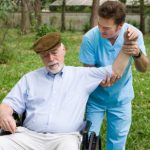VA community living centers are available for veterans that have served the United States armed  forces. These community living centers are touted as being more home-like than most nursing homes, and providing better services. Unfortunately, even in VA community living centers, veterans elder abuse is increasing as the population of elderly veterans increases. Veterans that stay in traditional nursing homes or in home residences may also be vulnerable to abuse.
forces. These community living centers are touted as being more home-like than most nursing homes, and providing better services. Unfortunately, even in VA community living centers, veterans elder abuse is increasing as the population of elderly veterans increases. Veterans that stay in traditional nursing homes or in home residences may also be vulnerable to abuse.
Types of Veterans Elder Abuse
All types of veterans elder abuse increase the risk of death and lower the quality of life for the patient. While physical forms of abuse are most often thought of as being detrimental, emotional and financial abuse can be equally destructive to a patient’s health and well being. Financial abuse can leave a patient without a home or necessary medication. Emotional abuse can leave a patient emotionally crippled, and lead to self-neglect or self-harm. Physical or sexual abuse can undermine physical health, as well as causing emotional problems.
Substance Abuse
Substance abuse is a growing problem for veterans, with many veterans abusing prescribed medications. Substance abuse can affect cognitive function, making the elderly veteran even more susceptible to abuse. Caregivers or other abusers may also intentionally over-medicate elderly veterans in order to get away with abuses.
Veterans Elder Abuse Risk Factors
Veterans may be physically disabled or emotionally traumatized, which may increase the vulnerability to abuse. A veteran that has impediments to mobility may have trouble physically seeking help. Emotional trauma may also delay a patient from seeking help for many reasons, including fear of abandonment or pride. Abusers may understand and take advantage of these limitations.
Post Traumatic Stress Disorder
Post traumatic stress disorder, or PTSD, may be a contributing factor to abuse. Veterans that are affected by PTSD may hallucinate, so abusers may feel secure that claims of abuse will not be believed. Veterans with PTSD may also be prone to lashing out at caregivers and staff, which can lead unstable caregivers to feel justified in abusing the veteran. PTSD may also leave veterans confused, making details of abuse difficult to recall for investigative purposes.
Financial Abuse
Disabled veterans may be especially susceptible to financial abuse, as veterans that have been disabled in the line of duty are given a pension that may attract the attention of those in a position to financially exploit or abuse the patient. VA appointed fiduciaries, caregivers, family members, religious leaders, or salesmen may persuade or threaten patients into buying unnecessary items or giving cash as a gift. Patients may feel obligated to provide the money, especially if the financially abusive party is a caregiver.
Preventing Veterans Elder Abuse
Patients may be able to prevent veterans elder abuse, in some cases. Patients may be able to set financial affairs in order, so that no one party has sole power over finances. If the patient is still cognitively functional, the patient may be able to prevent veteran elder abuse by touring VA community living centers or other care facilities prior to residency. Patients may also be able to report any abuse to an attorney or organization specializing in veterans elder abuse.
Organizations for Elder Abuse Prevention
There are now a number of organizations devoted to preventing veterans elder abuse, with National Adult Protective Services being one of the oldest and most active in the United States. Many organizations are geared towards preventing financial abuse, exposing scams targeting elderly veterans, and prosecuting responsible parties. Others are geared towards public awareness of the growing problem of veterans elder abuse, and work to make individuals aware of signs that may indicate abuse.
Handling Veterans Elder Abuse
If it is suspected that a veteran has been the victim of elder abuse, an attorney may be able to provide guidance, including taking steps to begin an investigation. An attorney may be able to assist family members in the best course of action for recovering costs associated with treatment for abuse, as well. An attorney may also be able to provide information for holding the individual or facility responsible for the abuse, and preventing further abuses against elderly veterans.
Sources:
“Elder Abuse and Neglect Among Veterans in Greater Los Angeles: Prevalence, Types, and Intervention Outcomes.” PubMed.gov. USA.gov, n.d. Web. 25 Feb 2014. <http://www.ncbi.nlm.nih.gov/pubmed/16803784>.
“Help Veterans Protect Themselves from Scams and financial Abuse.” Center of Excellence on Elder Abuse & Neglect. University of California, n.d. Web. 25 Feb 2014. <http://www.centeronelder
“What is Adult Protective Services?.” National Adult Protective Services Association. National Adult Protective Services Association, n.d. Web. 25 Feb 2014. <http://www.napsa-now.org/about-napsa/>.
